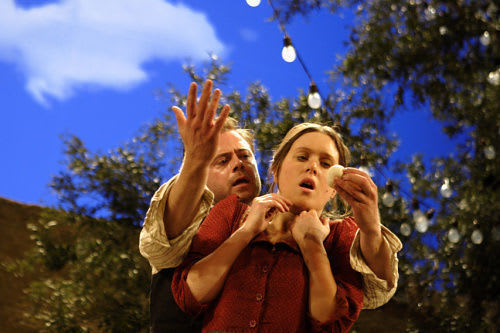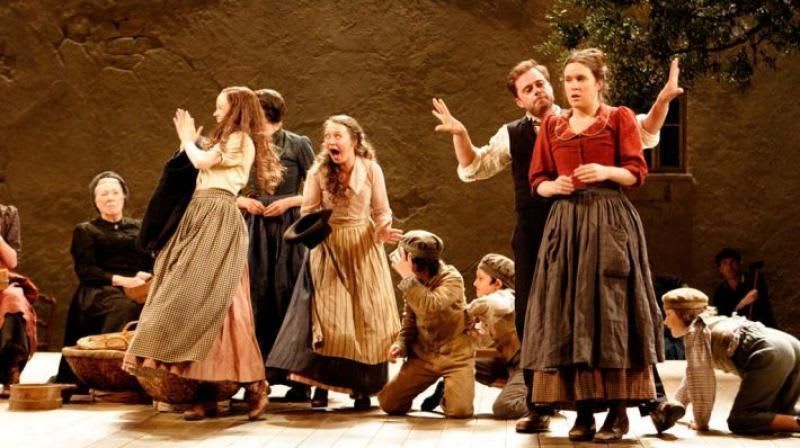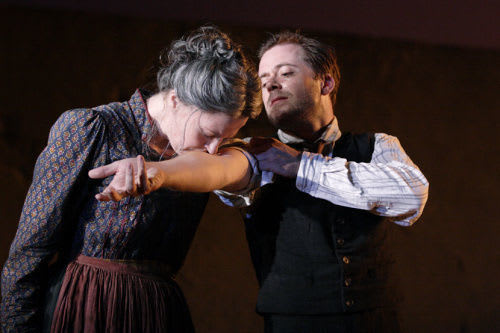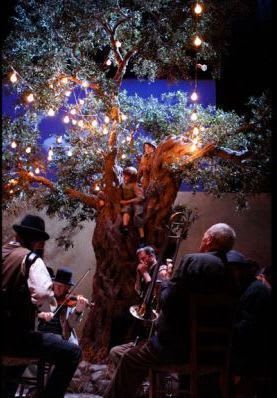This is not the kind of play you might expect from Pirandello either in form or content, it doesn’t play theatrical games with situation or identity and even the dramatist said “it is so light-hearted it doesn’t seem one of my works”. But though it is a comedy for some of its characters its events are deadly serious and disturbing.
The jovially ebullient title character (whose name means here or there, li-o la) is quite literally a celebration of the life force for if he’s not with one woman he’s with another with especially fecund results. He and his mother are already raising three small boys borne by different women. In a little Sicilian village where men are in short supply it seems that women can’t resist him. With Rory Keenan’s attractive, seductively flirty Liolà you can see why, he is a joyful presence who always seems to have a song on his lips (and a band on hand to accompany his singing).
Now Liolà has made another girl pregnant, Tuzza Azzara. He’s thinking of marrying her but she and her mother Croce have another plan that involves the richest man for miles around, an ageing landowner called Simone Palumo. Five years ago widower Simone married for the second time to Liolà’s childhood sweetheart Mita, but so far she has not produced a child and the old man wants an heir. The dance with which the play gets going has the appearance of some kind of fertility rite to end what everyone assumes is her barrenness. But is it she or he who can’t produce a child?
Designer Anthony Ward provides an atmospheric set that, aided by Neil Austin’s lights evokes a sun baked village square in full sun or at evening. A wooden platform that fills most of the space and strings of lights that reach out into the auditorium suggest all is ready for a fiesta and in front of a huge gnarled olive tree a band is always ready to strike up a tune. Although Liolà, who is a dab hand at conjuring tricks, seems to control them with an outstretched arm, they may not always, or perhaps ever, actually be there, but Orlando Gough has composed some gorgeous music for them and his many songs make a huge contribution to the success of director Richard Eyre’s production; the music and the dancing are delightful.
Conniving Tuzza, forcefully played by Jessica Regan and Aisling O’Sullivan’s raging Croce, think they’ve found a way to secure their futures and bolster Simone’s public image but Liolà has an even more clever plan to give both himself and the old man satisfaction. At first affronted, Lisa Dwyer Hogg’s hard-done by Mita goes along with it.
Eyre has created a real community with the villagers in the square shelling Simone’s almond crop, the three little boys rushing around and climbing into the tree, the gossiping neighbours Mita’s Aunt Gesa (Rosaleen Linehan), Carmina (Eileen Walsh) and Ninfa (Charlotte Bradley) all giving spirited performances. Physically it evokes the air of Sicily but, presumably trying to find an English language equivalent of the local dialect of Agrigento, Pirandello’s birthplace, Eyre to have it played with Irish accents, while the music draws on Balkan gypsy influences . For many of the audience, myself included, the accent, especially when delivery is rapid, poses some problems of comprehension. While vigorous performances leave no doubt about what is happening some of the verbal humour gets through only patchily. Sometimes laughter came only from pockets of people in the audience, people either more familiar with the accent or better placed acoustically, but that is a minor irritation in a show so full of life.
Liolà runs for about 1 hour 40 minutes without an interval.



